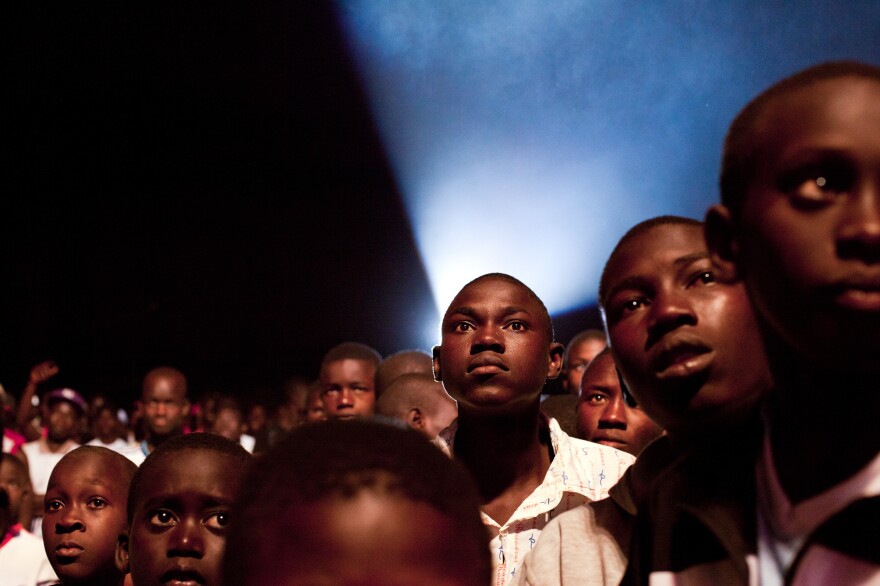An orange streetlight glows over the sandy street corner. The surrounding alleys and cement buildings disappear into darkness at the edge of the light. It is 11 p.m. on this July night, temperatures are still in the high 80s and a cool breeze is nowhere to be found.
Young men hustle to arrange hulking, rusted speakers on either side of a small wooden platform. Others hover by the streetlight. They wear crisp T-shirts with bold lettering and splashes of color.
A loud beat blasts from the stacks of speakers, drawing dozens of people out into the center of the street. They look up as the announcer steps to the front of the stage and begins a droning chant: "RaaaaWuuuuuuu." Then the duo Rawu Street launches into songs about being raised in the slums. Heads begin to nod, fists pump in the air and the show gets going.
This is the hip-hop scene on the outskirts of Dakar, the capital of Senegal. Hip-hop culture was born in the south Bronx but has spread around the world. And everywhere it goes, hip-hop is a way for young people to say what's on their mind. There's even a community center in Senegal devoted to promoting hip-hop in underdeveloped suburbs. Founded by the Senegalese rapper Matador and called Africulturban, the center holds a free star-studded rap festival each year in Dakar and helps young artists polish their skills.



On this night in Guediawaye, a densely populated neighborhood of about 300,000 people, the rappers — almost all of whom are men — are very aware of their mission.
"We are the voices of the voiceless," says the rapper known as Ngoom Doom, half of Rawu Street, "For us that is hip-hop."
The rappers — and their fans — have their roots in Futa Toora, a once-fertile stretch of land along the Senegal River, some 150 miles from Dakar and not far from the Sahara Desert. Since the 1980s, rainfall has been steadily decreasing in this region. Many of the farmers along the river moved to the capital in search of a better life. They settled in sandy lots just outside the city, crowding into cement houses in walled compounds with their extended families and their goats.
In the neighborhood of Guediawaye, people cope with blackouts and flooding from the poor drainage. The children of the migrants grew up seeing their parents struggle and soon were struggling themselves. There aren't enough jobs for the new generation.
Hip-hop gives the men a way to express their frustrations. They spit their anger into microphones and shout their lyrics into the sea of the audience.
"Same cats, same dogs / same electoral promises / it's only two years and we're already fed up." That's the lyrics to "Diogoufi," which means "nothing has changed" in the local Wolof language. It's written by the group Keur Gui — Wolof for "home."







The young people of Dakar rap mainly in Wolof. They hold forth on life, love, inequality, pain and money. They hope for fame, but it usually doesn't come. Didier Awadi, grandfather of Senegalese rappers, and his group Positive Black Soul is one of the few to achieve international acclaim.
Mainly they dream of a different future for themselves and their families.
"I know that hip-hop can change Senegal." says rapper Alassane "Khohk" Kadia. "I can feel it inside my heart."
Claire Harbage is a documentary photographer. She holds degrees in African studies as well as photography from Ohio University and teaches at the Maine Media Workshops. Ryan Kellman is a photographer and photo editor for NPR's Science Desk. In 2013, Harbage began working on a documentary about the hip-hop scene in Dakar, Senegal.
Copyright 2023 NPR. To see more, visit https://www.npr.org.



